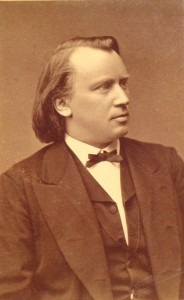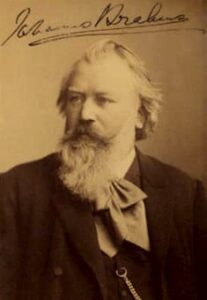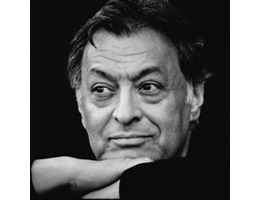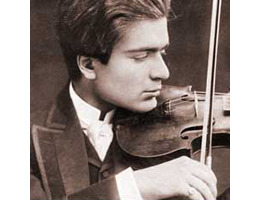
The young Brahms
In 1900, when Boston’s Symphony Hall was being built, Philip Hale, a distinguished American music critic working for the Boston Herald, suggested that a sign should be fitted over the central doorway reading, “Exit in case of Brahms”! Hale’s message is clear, if Brahms is on the program, run away as quickly as you can. We rightfully might dismiss Hale’s suggestion as sour grapes; however, at the turn of the twentieth century music criticism was not alone in expressing a pejorative and highly negative opinion of Brahms. Pyotr Ilyich Tchaikovsky wrote: “I played over the music of that scoundrel Brahms. What a giftless bastard! It annoys me that this self-inflated mediocrity is hailed as a genius.” Hugo Wolf suggested, “The art of composing without ideas has decidedly found in Brahms one of its worthiest representatives.” Gustav Mahler, after his first composition failed to win a prize, with Brahms at the head of the selection committee, wrote “I have gone through all of Brahms pretty well by now. All I can say of him is that he’s a puny little dwarf with a rather narrow chest.” And Benjamin Britten quipped, “It’s not bad Brahms I mind’, it’s good Brahms I can’t stand.” Friedrich Nietzsche suggested that the music of Brahms “perspires profusely,” and to George Bernard Shaw it sounded, “extremely constipated.” These exaggerated visceral reactions and earthy comparisons to bodily functions are not merely the result of professional jealousy or the effect Brahms’s music had on his critics. Rather, the vicious and personal nature of the criticism suggests that the real target was Brahms himself. However you look at it, there is a clear disconnect between the way Brahms was perceived at the turn of the 20th-Century, and the way we think of him today. Instead of giving you a play by play of the labored gestation of the Symphony No. 1 in C minor, Op. 68 — and indeed, Brahms spent nearly twenty-one years completing this work — let us briefly untangle the mechanism that fused Brahms the man and Brahms the composer into an idealized and naïve package for easy consumption.
Johannes Brahms: Symphony No. 1 in C minor, Op. 68 – I. Un poco sostenuto – Allegro (Vienna Symphony Orchestra; Sergiu Celibidache, cond.)

Johannes Brahms
Photographs of the composer, taken by Maria Fellinger in the 1890’s, show a kind and gentle old man with flowing beard, highly reminiscent of imagery associated with Santa Claus. In one of these extraordinary photographs, Brahms is sitting in his personal library surrounded by books and musical scores. And this is exactly how we think of Brahms today; a grand, old master of an extended Austro-German musical traditions, exclusively absorbed with musical history and knowledge, and defending his way of thought against all corrupting influences of a rapidly encroaching and changing world. This particular way of thinking about Brahms was actively shaped and promoted in the late 1940’s and early 1950’s. Musicologist working at Universities in the United States and Europe, together with historians and politicians were, after the horrors of WW2 and the atrocities committed by Nazi Germany, actively searching for a kinder and gentler German. And a German Santa Claus figure whose only goal in life was to compose, perform and live in the service of music did fit that image perfectly. Yet, Brahms was hardly a nice and gentle soul. He had a strong dislike for the French, the Russians, the English and the Americans, really anything that would pose a threat to German cultural and political supremacy. Paired with a strong dose of pessimism as to the future of German culture, he was highly patriotic and militantly opposed to foreign influences. He hated almost everything having to do with technology, especially despised cameras and bicycles, and his relationship with women was ambivalent at best. He publicly embarrassed them whenever he could — telling dirty jokes or making sexually explicit comments — and only began to show real interest in them once they were married to somebody else. In addition, Brahms utterly dominated the Viennese musical scene in terms of administration and governance. He was a highly active member of the most important committees, legislative boards and funding commissions and every appointment at the Conservatory, the University or private music institutions were subject to his approval or venomous contempt. When Hans Rott, a highly talented composer and the natural musical link between the symphonic works of Anton Bruckner and Gustav Mahler submitted the first movement of his E-major Symphony to a composition contest, Brahms told him that he “had absolutely no talent whatsoever, and that he should give up music altogether.” Unable to deal with this rejection, Rott bought a revolver and threatened a passenger during a train journey, claiming that Brahms had filled the train with dynamite. Rott was eventually committed to a mental hospital, where he died at age 25.
The charges leveled against Brahms by his contemporaries were made in the context of his abrasive personality, his radical nationalist political position, his professional influence, and against his music, which was seen as old-fashioned, introvert, dry and complex. Many composers and critics wanted Brahms and his music to be swept away by a new wave of music, commonly referred to as the “music of passion.” Proponents of Brahms’s music stubbornly and innocently maintained that his music came from intuition, that is, he composed music exclusively for the sake of expressing music. This conception clearly clashed with those who promoted compositions that sought overt connections to extra-musical elements — be it poetry, literature or architecture — seeking a programmatic content that involved a process of conscious reflection. Ironically, Brahms’s passions — which are best understood in terms of his personality and convictions — are clearly present in his music; he simply did not feel like providing written explanations. His patriotism, aggression, yearning, ambivalence towards women — frequently juxtaposing the idealized image of the Virgin Mary against the common prostitute in the street — and even his “constipation” are essential aspects of his compositions. So let’s not get stuck in some artificially constructed musical Disneyland but rather discover what makes the music of Brahms one of the most powerful, tightly strung, and abrasive musical expressions of the 19th century.
For more of the best in classical music, sign up to our E-Newsletter




Brahms was a consummate master. His form and technique are precise and do not stray to please or pander. There is a clear approach, a precise focus upon statement and development. The orchestration is uniquely Brahms and never employs the extraneous. The composer never employs the huge sensual sound color world of Wagner. It is formal structure end expression that motivates Brahms.
Schönberg was right. Brahms’s music is in itself very innovative, even when it sounds like music in the traditional German Romantic fold. Just listen carefully to his last piano pieces.
It’s always a revelation to hear how so many composers absolutely despised each another, and by extension, their music. We all have this idealized vision of them, arms wrapped around each other in fraternal affection. Far from it! It makes me wonder what present-day composers think of each other, beyond the perfunctory public displays of “support”.
I love both Wagner and Brahms but for me the craftsmanship and music ideas that Brahms develops so brilliantly make him my favorite composer, the one whose works I will take when banished to a desert island. Schoenberg was a devotee and his Verklaerte Yacht was inspired by the magnificent String Sextet in G major, opus 36. Conversely Brahms (who lived in Vienna at the same time as Schoenberg though they never met) saw an early manuscript of Schoenberg! Brahms’ genius at melding superb craftsmanship with beautiful and excruciating romantic themes probably upset lots of lesser composers such as Tchaikowsky. Wagner probably recognized Brahms’ talent but took issue with Brahms’ adherence to traditional structures. (Let’s not overlook the influence of the extremely romantic Schumann on Wagner’s music; check out Paradise and the Peri, and his Scenes from Goethe’s Faust). Brahms’ lived the life of a disciplined artist for whom music was the supreme art, and made the decision to not be diverted from his calling. He loved Clara Schumann deeply but after helping her upon Robert’s death, he moved away and for most of his life his relationship to her was mostly in letters though she did perform much of his music. Off and on he was attracted to various women but for him his musical art was in effect his whole life. He may have been a musical classicist but his music was intensely romantic. No one exceeds him.
I find it hard to believe all the terrible things the article says about Brahms as a person. No sources are given. It would have been more believable if footnotes with sources had been provided.